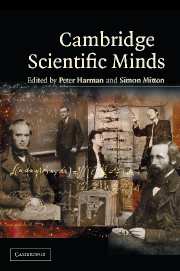Book contents
- Frontmatter
- Contents
- Foreword
- Introduction
- 1 William Gilbert
- 2 William Harvey
- 3 Isaac Newton: Creator of the Cambridge scientific tradition
- 4 William Whewell: A Cambridge historian and philosopher of science
- 5 Adam Sedgwick: A confident mind in turmoil
- 6 Charles Babbage: Science and reform
- 7 Charles Darwin
- 8 Stokes and Kelvin, Cambridge and Glasgow, light and heat
- 9 James Clerk Maxwell
- 10 The duo from Trinity: A.N. Whitehead and Bertrand Russell on the foundations of mathematics, 1895–1925
- 11 Thomson, Rutherford and atomic physics at the Cavendish
- 12 Hopkins and biochemistry
- 13 Charles Sherrington, E.D. Adrian, and Henry Dale: The Cambridge Physiological Laboratory and the physiology of the nervous system
- 14 Hardy and Littlewood
- 15 Arthur Stanley Eddington
- 16 Paul Dirac: A quantum genius
- 17 Alan Turing
- 18 Francis Crick and James Watson
- 19 Mary Cartwright
- 20 Joseph Needham
- 21 Molecular biology in Cambridge
- 22 The discovery of pulsars – prelude and aftermath
- 23 Stephen W. Hawking
12 - Hopkins and biochemistry
Published online by Cambridge University Press: 05 June 2014
- Frontmatter
- Contents
- Foreword
- Introduction
- 1 William Gilbert
- 2 William Harvey
- 3 Isaac Newton: Creator of the Cambridge scientific tradition
- 4 William Whewell: A Cambridge historian and philosopher of science
- 5 Adam Sedgwick: A confident mind in turmoil
- 6 Charles Babbage: Science and reform
- 7 Charles Darwin
- 8 Stokes and Kelvin, Cambridge and Glasgow, light and heat
- 9 James Clerk Maxwell
- 10 The duo from Trinity: A.N. Whitehead and Bertrand Russell on the foundations of mathematics, 1895–1925
- 11 Thomson, Rutherford and atomic physics at the Cavendish
- 12 Hopkins and biochemistry
- 13 Charles Sherrington, E.D. Adrian, and Henry Dale: The Cambridge Physiological Laboratory and the physiology of the nervous system
- 14 Hardy and Littlewood
- 15 Arthur Stanley Eddington
- 16 Paul Dirac: A quantum genius
- 17 Alan Turing
- 18 Francis Crick and James Watson
- 19 Mary Cartwright
- 20 Joseph Needham
- 21 Molecular biology in Cambridge
- 22 The discovery of pulsars – prelude and aftermath
- 23 Stephen W. Hawking
Summary
Frederick Gowland Hopkins has gone down in history as ‘the father of British biochemistry’, and it was largely through his efforts that the Cambridge Department of Biochemistry became a centre of world renown. The department was established in 1914 and Hopkins was its first Professor, until his retirement at the age of eighty-two in 1943. Between the two world wars, Hopkins and his colleagues put into place an exceptionally wide-ranging programme of biochemical research, developed degree course teaching and research training in the subject, and hosted visiting researchers from every continent. By the time of Hopkins' death in 1947, some seventy-five former members of the department had been elected to professorial chairs worldwide.
While Hopkins' legacy is celebrated among biochemists, his career in Cambridge did not run a uniformly smooth path. Before he acquired his own department, Hopkins had to struggle very hard to find the time, laboratory space and resources to do the biochemical research he wanted to pursue in the Cambridge Physiological Laboratory. Later, in the 1920s, concerted efforts were made to place the leadership of his department in other hands, albeit unsuccessfully. In both cases, Hopkins' particular ambitions for biochemistry went far beyond the expectations, or indeed wishes, of his peers. Here I shall outline these ambitions, the contexts within which Hopkins pursued and defended them, and some of the obstacles that faced him.
FROM PHYSIOLOGY TO BIOCHEMISTRY
Hopkins was trained in analytical chemistry and subsequently qualified at medical school.
- Type
- Chapter
- Information
- Cambridge Scientific Minds , pp. 172 - 186Publisher: Cambridge University PressPrint publication year: 2002
- 1
- Cited by



